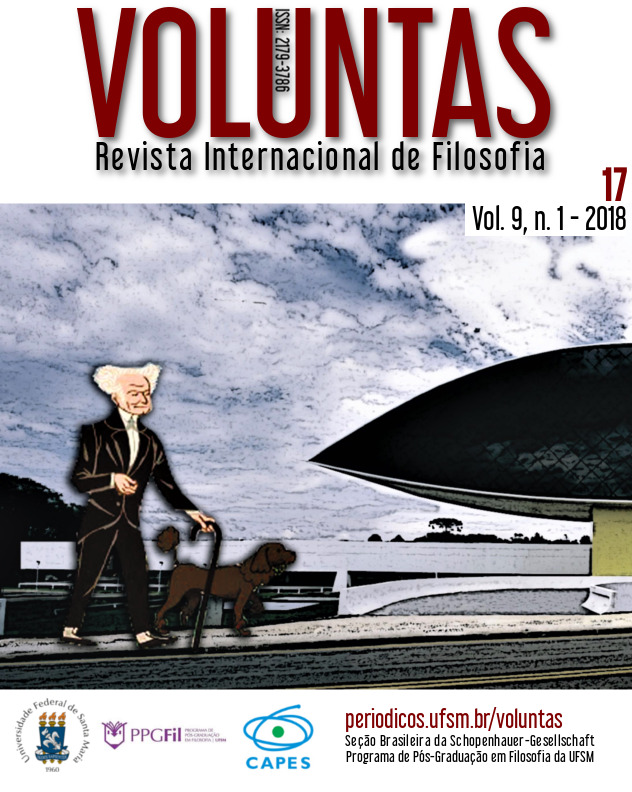A philosophical epistolary: the correspondence between Schopenhauer and Johann Ausgust Becker
DOI:
https://doi.org/10.5902/2179378633544Keywords:
Arthur Schopenhauer, Correspondência, Escola de Schopenhauer, Johann August BeckerAbstract
A correspondência entre Schopenhauer e seus discípulos – cuja edição italiana eu acabei de finalizar, realizando a tradução e a redação de um aparato crítico novo e completo – é a principal fonte para o conhecimento daquela que é entendida como a Escola de Schopenhauer em sentido estrito, e constitui-se de um modo especial como indispensável para o conhecimento da personalidade dos discípulos de Schopenhauer que não escreveram sobre ele e que o filósofo chamava de Apóstolos, para distingui-los dos Evangelistas, os discípulos que escreveram sobre ele. Entre os Apóstolos destaca-se a figura de Johann August Becker, com o qual em 1844 Schopenhauer manteve uma correspondência filosófica sobre o tema da afirmação e da negação da vontade, da liberdade do querer, da doutrina do caráter e do critério das ações morais, correspondência que chegou até nós sem lacunas. A sua importância é tal que no interior da escola circulavam três cópias dela, um sinal de como os discípulos de Schopenhauer consideravam-na como documento fundador de sua organização.Downloads
References
CIRACÌ, F. Die Gelassenheit im Rahmen des Quietismus Eduard von Hartmanns und Philipp Mainländers. Schopenhauer-Jahrbuch, 90 (2009), pp. 179-188.
GOETHE, W. Vanitas! Vanitatum vanitas! In: Goethes Werk in Kontext. Bd. I. Berliner Ausgabe auf CD-ROM. Berlin: Aufbau-Verlag, 2005.
HÜBSCHER, A. Der Briefwechsel J. A. Becker - A. von Doß. Schopenhauer-Jahrbuch, 1934.
KANT, I. Critica della ragion pura. A cura di C. Esposito. Milano: Bompiani, 2007.
LÜTKEHAUS, L. Esiste una sinistra schopenhaueriana? Ovvero: il pessimismo è un quietismo? In: D. M. Fazio; M. Koßler; L. Lütkehaus. Arthur Schopenhauer e la sua scuola. Lecce: Pensa MultiMedia, 2005.
RÉE, P. Osservazioni psicologiche. A cura di D. M. Fazio. Lecce: Pensa Multimedia, 2010.
SIMMEL, G. La cosa più indifferente. Un dilemma morale. In: Sul pessimismo. A cura di D. Ruggieri. Roma: Armando, 2006.
SCHOPENHAUER, A. Die beiden Grundprobleme der Ethik. Frankfurt a. M.: Hermannsche Buchhandlung, 1841.
SCHOPENHAUER, A. Die Welt als Wille und Vorstellung. Zweiter Band welcher die Ergänzungen zu den vier Büchern des ersten Bandes enthält. 2 Bde. Leipzig: Brockhaus, 1844.
SCHOPENHAUER, A. Gespräche. Hrsg. von A. Hübscher. Stuttgart Bad Cannstatt: Fromman, 1971.
SCHOPENHAUER, A. Briefwechsel zwischen Arthur Schopenhauer und Johann August Becker. Hrsg. von J. C. Leipzig: Becker, 1883. In: A. Schopenhauer. Gespräche. Hrsg. von A. Hübscher. Stuttgart Bad Cannstatt: Fromman, 1971.
SCHOPENHAUER, A. I colloqui. A cura di A. Verrecchia. Milano: Rizzoli, 2000.
SCHOPENHAUER, A. Sobre o fundamento da moral. Trad. Maria Lúcia Cacciola. São Paulo: Martins Fontes, 2001.
SCHOPENHAUER, A. O mundo como vontade e como representação. Tomo I. Trad. Jair Barboza. São Paulo: Unesp, 2005.
SCHOPENHAUER, A. Carteggio con i discepoli. Tomi I e II. A cura di D. M. Fazio. Lecce: Pensa MultiMedia, 2018 (Schopenhaueriana, 12).
STIRNER, M. O único e a sua propriedade. São Paulo: Martins Fontes, 2009.
VITALE, M. Dalla volontà di vivere all’inconscio. Eduard von Hartmann e la trasformazione della filosofia di Schopenhauer. Lecce: Pensa MultiMedia, 2014.
Downloads
Published
How to Cite
Issue
Section
License
The submission of original manuscripts to this journal implies the transference, by the authors, of the copyrights for printed and digital publication. The copyrights of a published manuscript belong ultimately to the author, and only the copyright for its first publication is reserved to the journal. Authors may only use the same results in other publications explicitly indicating this journal as the medium of the original publication.
Licence
Attribution-NonCommercial-ShareAlike 4.0 International (CC BY-NC-SA 4.0) - This license lets others remix, tweak, and build upon your work non-commercially, as long as they credit you and license their new creations under the identical terms.






